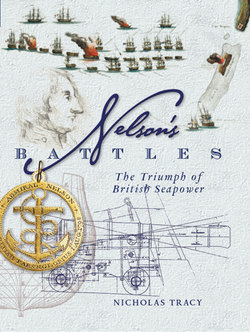Читать книгу Nelson's Battles - Nicholas Tracy - Страница 8
На сайте Литреса книга снята с продажи.
ОглавлениеForeword
HORATIO NELSON exercises an enduring fascination. Put in today’s terms, he is the stuff of which tabloid headlines are made, combining heroism, charisma and tactical genius with very human faults, including what may be regarded as a loose approach to ‘traditional family values’. As the bicentenary of Trafalgar approaches, the one naval hero whose name remains generally familiar will doubtless become once again a household word.
Dr Tracy’s book is not a ‘mere biography’, nor is it hagiography. Nelson’s Battles is the vehicle for a study of the nature and conduct of war at sea during the first true ‘World War’ and it will stand as a most useful reference work for anyone who wishes to look beyond the man and his achievements. It is also an eminently suitable book for the lay reader or beginner in naval history, for scholarship is combined with a deft narrative style and nicely chosen contemporary comments by acquaintances and participants in the battles.
It is sometimes difficult to remember in these days of rapid change, 200 years after Nelson’s battles, that the essentials of sea warfare had not changed a great deal during the 200 years which preceded them. Wooden ships were still propelled by scarcely predictable natural forces, the main weapon was still loaded from the same awkward direction (and engagement ranges were, if anything, rather shorter), while the commanders’ control of fleet engagements were as limited as their communications. Yet Nelson’s generation brought something different and transformed the formal, stately but often sterile dance of a battle under sail into a shocking brawl. These captains had what might nowadays be known as the ‘killer instinct’ and, loosed from the shackles of the rigid line by admirals such as Nelson and his mentor, John Jervis, they probed for and exploited weakness with a ferocity which they transmitted to their officers and men and which repeatedly overwhelmed their opponents.
For a captain of a ship of the line serving with a main fleet opportunity came seldom – there were barely a dozen major actions between 1793 and 1805 – but not just promotion and prize money beckoned those who distinguished themselves: perhaps for the first time in an external war, there was the genuine dislike of an enemy for the sake of his ideology. Nelson acted as a touchstone, for service alongside and later under his command seldom attracted anything but success – the Tenerife and Boulogne enterprises were notable exceptions. Altogether, over a hundred captains served with or for him in eleven actions afloat, three of these – Thomas Fremantle, Robert Miller and Thomas Foley – serving with him on five occasions. Some of them, like Philip Durham, Henry Digby and James Gore, had already distinguished themselves in a dozen successful actions apiece in the nursery of great seamen, the continuous blockade of the coast of France, before promotion to 74s and allocation to Nelson’s command.
Whether these men were familiar with his ways or they came to him as accomplished fighting seamen, Nelson provided inspiration and leadership which filtered down to the lower deck, where prize money and promotion counted for little and ideology was limited to the efforts of the United Irishmen to provoke mutiny. The disturbances which affected the Mediterranean Fleet did not affect the outcome of the Tenerife expedition and the battle of the Nile was won by a squadron including four ships which had, at the least, displayed what St Vincent described as ‘ill humour’ just a year before. Mutiny, the evils of ‘the Press’ and the social shortcomings of life between decks make more attractive popular reading than the seamanship and gunnery drills instilled into the ordinary sailors to create and perpetuate such a fearsome fighting machine.
His premature death, during the battle which is often regarded as England’s finest nineteenth-century hour, turned high competence and charisma into legend. In the years after his death, Nelson came to represent, to the general public, the general superiority, if not invincibility, of the Royal Navy and its men – in which the sense of pride was so strong that one well-known tragedian could get away with dancing the hornpipe in ‘King Lear’ because in his salad days he had been a sailor under Nelson at the Nile, Copenhagen and Trafalgar!
How the hero would have fared in the post-Trafalgar era of undeniable maritime superiority stands open to question, but this is not something which Nicholas Tracy attempts to guess. The man should be remembered by his battles and these are worthily described.
David Brown
